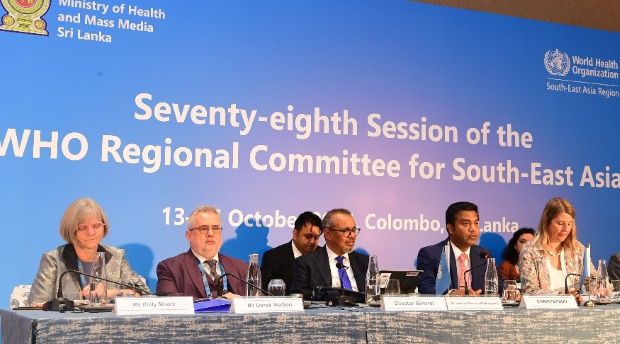COLOMBO – The 78th Session of the World Health Organization’s (WHO) Regional Committee for South and South-East Asia commenced in Colombo on Monday (13), with a strong focus on promoting healthy ageing through strengthened primary healthcare and combating the rising use of smokeless tobacco.
The three-day event, hosted by the Government of Sri Lanka, brings together health ministers and senior officials from all 11 member states of the region. The delegates will also discuss expanding the South-East Asia Regional Health Emergency Fund (SEARHEF) and accelerating action against antimicrobial resistance (AMR), which WHO has identified as one of the top global health threats.
WHO Director-General Dr Tedros Adhanom Ghebreyesus, WHO South-East Asia Office-in-Charge Catharina Boehme, and several other WHO experts attended the opening session in Colombo.
As the regional governing body for WHO, the committee is expected to adopt new resolutions on priority health issues and review the progress made on past commitments. One of the most significant outcomes anticipated from the meeting is the adoption of a declaration on healthy ageing.
The focus on ageing is timely, as countries in the region are witnessing a rapid increase in the population over 60 years old, creating new demands on health systems, social protection, and long-term care. WHO is advocating for stronger primary health care, community-based support, and improved access to essential services to ensure that ageing populations can live healthier, longer, and more dignified lives.
Another major agenda item is curbing the use of smokeless tobacco, electronic cigarettes, nicotine pouches, and areca nut. The South and South-East Asia Region bears a disproportionate burden of global tobacco use, accounting for one-third of all tobacco users worldwide, over 280 million adult smokeless tobacco users and approximately 11 million adolescent tobacco users.
Experts warn that the growing popularity of new and emerging nicotine products is undermining tobacco control efforts and increasing the risk of oral cancer, heart disease, and other non-communicable diseases. Member states are expected to explore stronger regulatory frameworks and public health campaigns to address these threats.
Delegates will also examine the need to increase the corpus of SEARHEF to better prepare for future health emergencies, drawing lessons from the COVID-19 pandemic and recent climate-related disasters in the region.
In addition, the meeting will look at strategies to combat antimicrobial resistance (AMR), which is reducing the effectiveness of life-saving antibiotics and threatening modern medicine. WHO is calling for coordinated action to curb the misuse of antibiotics in both humans and animals.
Home to nearly 2 billion people, the WHO South and South-East Asia Region is prioritizing a holistic approach to public health. Key focus areas include strengthening mental health and overall well-being; increasing investment in women, girls, adolescents, and vulnerable communities; harnessing technology and innovation for health service delivery and building capacity, improving knowledge management and supporting research
Ultimately, the goal of the session is to promote, protect, and provide for the health and well-being of all people in the region, while reinvigorating efforts to get health-related Sustainable Development Goals (SDGs) back on track.
-ENCL



Comments are closed, but trackbacks and pingbacks are open.